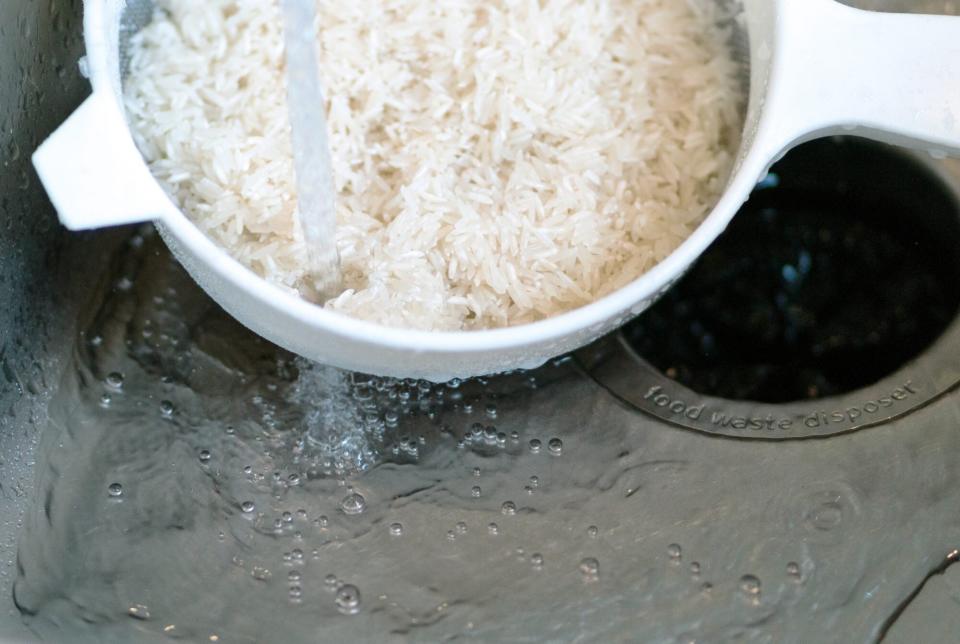Yes, You Should Wash Rice Before Cooking It—Here's How
When it comes to food prep, it's customary to wash fruits and vegetables before cooking and eating them. But what about rice, the ultimate pantry staple? As it turns out, rinsing your grains is a key step if you want to make the perfect pot of rice, and that's true whether you're preparing a creamy rice pudding or whipping up a savory chicken and rice soup. Ahead, experts break down why (and how) you need to wash rice—plus, they share their best tips for doing so.
Related: Our Test Kitchen Shares Their Favorite Grains and How to Cook Them
Why You Should Always Wash Rice
The reason for washing rice (or any food, for that matter) is cleanliness. Rinsing rice removes dirt, dust, debris, chemicals, and bugs—in short, you're getting rid of the types of things you probably don't want to eat in your finished rice dish. After all, by the time the rice arrives it your local supermarket, it has already traveled a lengthy journey. Along the way, it can pick up various substances during its voyage—or, in some cases, it may travel with substances that weren't properly removed during the manufacturing process in the first place.
Another reason to rinse rice is to remove excess starch on the rice kernels' surface. This "gives the cooked, finished product a fluffy texture with separate rice kernels," explains Matt Slem, culinary scientist and rice cooking expert at Lundberg Family Farms. Otherwise, without rinsing, the excess starch will remain on the rice, potentially yielding a gummy or overly sticky rice once cooked, explains Slem.

RobynRoper / Getty Images
What Types of Rice Should You Wash?
"There are differing opinions [on this topic], but I recommend rinsing all rice before cooking," says Slem. This applies to all rice varieties and sizes, including short-grain, medium-grain, and long-grain rice. Nik Sharma, cookbook author and recipe developer, agrees. "By habit, I wash all types of rice before cooking to get rid of any dust, soluble impurities, or harmful substances." He also washes rice regardless of where it came from (bulk bin or bag) or what the packaging says.
If you're cooking sticky rice, you might wonder if rinsing away the excess starch will reduce its tacky texture. According to Sharma, you shouldn't be concerned about that outcome. "Even with a short grain like sticky rice, washing doesn't affect the much-desired stickiness," he explains. The starch sitting inside the grain will come out during cooking, ultimately creating the sticky texture.
How to Wash Rice
Although all types of rice require rinsing, the exact method for each type varies slightly. If you're making a whole grain variety, pour the desired amount of rice into a mesh sieve, says Slem. Next, run the rice under cold water for about 30 seconds while gently shaking it. "You won't see any color changes [in the water] here, [as] this is just to rinse off any rice hulls or smaller broken rice kernels," explains Slem. Finally, "drain and transfer the rice into a rice cooker or chosen cooking vessel." As for white rice? Slem suggests following the same steps while shaking the rice and rinsing for one to two minutes. "The water will start out cloudy. After one to two minutes, it will be almost clear."
As you rinse the rice, avoid rubbing the grains with your fingers, says Sharma. "If you keep rubbing the grains of rice, [you'll create] friction between the grains and the runoff water will continue to be cloudy." Instead, let the water run through the grains without excessively touching the rice.
Washing Versus Soaking
You might have also heard about soaking rice before cooking it. For starters, washing and soaking have different purposes, so they aren't interchangeable steps. Whereas washing removes debris and excess starch, soaking reduces the overall cooking time, explains Sharma. Moreover, it might help reduce levels of arsenic in the rice, he adds. This is key because rice absorbs more arsenic than other grains, according to the Food and Drug Administration. To soak rice, wash the kernels according to the above steps, then soak it in water for at least 30 minutes, recommends Sharma. After 30 minutes, discard the water and cook the rice as usual.
